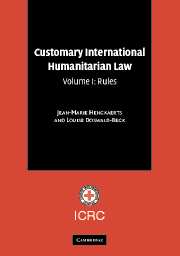Book contents
- Frontmatter
- Contents
- Foreword by ICRC President Jakob Kellenberger
- Foreword by Judge Abdul G. Koroma
- Foreword by Yves Sandoz
- Acknowledgements
- Introduction
- List of abbreviations
- Part I The Principle of Distinction
- Part II Specifically Protected Persons and Objects
- Chapter 7 Medical and Religious Personnel and Objects (Rules 25–30)
- Chapter 8 Humanitarian Relief Personnel and Objects (Rules 31–32)
- Chapter 9 Personnel and Objects Involved in a Peacekeeping Mission (Rule 33)
- Chapter 10 Journalists (Rule 34)
- Chapter 11 Protected Zones (Rules 35–37)
- Chapter 12 Cultural Property (Rules 38–41)
- Chapter 13 Works and Installations Containing Dangerous Forces (Rule 42)
- Chapter 14 The Natural Environment (Rules 43–45)
- Part III Specific Methods of Warfare
- Part IV Weapons
- Part V Treatment of Civilians and Persons Hors De Combat
- Part VI Implementation
Chapter 9 - Personnel and Objects Involved in a Peacekeeping Mission (Rule 33)
Published online by Cambridge University Press: 05 June 2012
- Frontmatter
- Contents
- Foreword by ICRC President Jakob Kellenberger
- Foreword by Judge Abdul G. Koroma
- Foreword by Yves Sandoz
- Acknowledgements
- Introduction
- List of abbreviations
- Part I The Principle of Distinction
- Part II Specifically Protected Persons and Objects
- Chapter 7 Medical and Religious Personnel and Objects (Rules 25–30)
- Chapter 8 Humanitarian Relief Personnel and Objects (Rules 31–32)
- Chapter 9 Personnel and Objects Involved in a Peacekeeping Mission (Rule 33)
- Chapter 10 Journalists (Rule 34)
- Chapter 11 Protected Zones (Rules 35–37)
- Chapter 12 Cultural Property (Rules 38–41)
- Chapter 13 Works and Installations Containing Dangerous Forces (Rule 42)
- Chapter 14 The Natural Environment (Rules 43–45)
- Part III Specific Methods of Warfare
- Part IV Weapons
- Part V Treatment of Civilians and Persons Hors De Combat
- Part VI Implementation
Summary
Rule 33. Directing an attack against personnel and objects involved in a peacekeeping mission in accordance with the Charter of the United Nations, as long as they are entitled to the protection given to civilians and civilian objects under international humanitarian law, is prohibited.
Practice
Volume II, Chapter 9.
Summary
State practice establishes this rule as a norm of customary international law applicable in both international and non-international armed conflicts.
International and non-international armed conflicts
State practice treats peacekeeping forces, which are usually professional soldiers, as civilians because they are not members of a party to the conflict and are deemed to be entitled to the same protection against attack as that accorded to civilians, as long as they are not taking a direct part in hostilities (see Rules 1 and 6). As civilians, peacekeeping forces are entitled to the fundamental guarantees set out in Chapter 32. By the same token, objects involved in a peacekeeping operation are considered to be civilian objects, protected against attack (see Rule 7).
Under the Statute of the International Criminal Court, intentionally directing attacks against personnel and objects involved in a peacekeeping mission in accordance with the Charter of the United Nations constitutes a war crime in both international and non-international armed conflicts, as long as they are entitled to the protection given to civilians and civilian objects under international humanitarian law. The Statute of the Special Court for Sierra Leone also includes the rule.
- Type
- Chapter
- Information
- Customary International Humanitarian Law , pp. 112 - 114Publisher: Cambridge University PressPrint publication year: 2005
- 2
- Cited by



